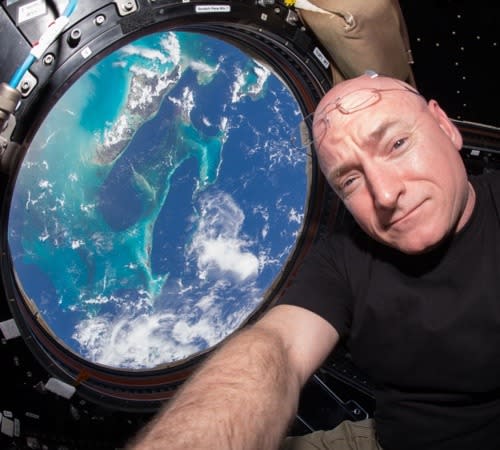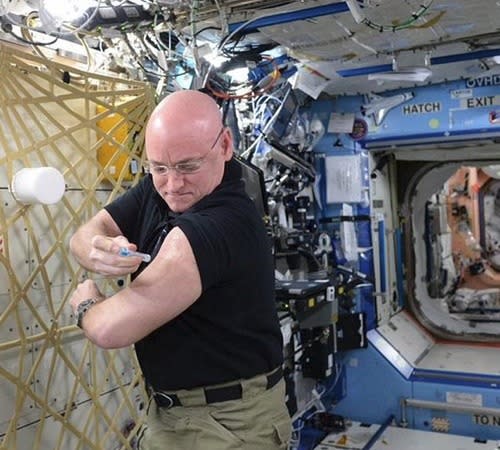Why astronaut Scott Kelly just spent a year in space

(Photo: NASA)
It’s been 340 days since NASA astronaut Scott Kelly took up residence on the International Space Station (ISS). That’s nearly a year confined to a space no longer than a football field traveling above the Earth in near-zero gravity at 5 miles per second.
Kelly spent all that time away from family, friends, and gravity in part to help NASA researchers better understand the impact of long-term periods in space on the human body.
It turns out space kind of hates humans. And it takes out its hatred on our soft, fleshy bodies by doing things like playing games with our immune systems, swelling our heads like balloons, and blasting us with radiation.
But Kelly is a unique astronaut in that he has a twin brother, astronaut Mark Kelly. By comparing the ways Scott’s body and brain may have changed while off planet with his earthbound twin’s, NASA hopes to figure out how it will get astronauts to Mars in one piece.
Them bones
A year in space is a long time to go without having gravity constantly pulling down on your body. And while life without gravity might mean you can finally do a backflip, it’s actually pretty terrible for your bones.
When your body realizes it doesn’t have to contend with the force of gravity, it decides it doesn’t need to waste energy maintaining thick bones. And so your bones start shrinking.
According to NASA, an astronaut can lose as much as 1 to 1.5 percent of the bone density in his or her hip in a single month. That’s as much as a person with osteoporosis loses in an entire year.

(Photo: NASA)
The lack of gravity also means your spine isn’t compressed anymore, so it can begin to expand, causing misaligned discs.
NASA hopes Kelly’s year in space could teach it how much bone loss astronauts might experience on trips to Mars, and how to prevent it.
In space, no one can hear you sneeze
While in space, your body is exposed to far fewer germs than it is here on Earth (where we have things like public restrooms and McRibs). And without needing to constantly battle pathogens, the thinking goes, our immune systems can weaken and potentially respond more slowly to potential threats from bugs.
NASA, however, also thinks our immune systems could actually become more responsive than normal, due to stress from microgravity, radiation, and the fact that you’re living in outer-freaking-space.
To see whether that’s the case, Scott Kelly and Mark Kelly received a series of flu shots, starting before Scott took off and continuing when he was in space. Six months from now, the brothers will receive their final shot.

(Photo: NASA)
The first week after each shot, the brothers had their blood drawn, to see how their immune systems responded to the vaccine.
The end result of the studies, researchers hope, will be to understand how NASA can keep astronauts healthy while in space and potentially tailor vaccines to individuals based on their specific body chemistry.
The added benefit is that the study could teach researchers how to tailor vaccines for people back on Earth to reduce side effects.
Full exposure
Space is full of radiation. Thankfully, here on Earth, we’re protected from much of it by the planet’s atmosphere and magnetic field. On the International Space Station, you lose that protection.
As a result, you’re exposed to way more radiation when you’re in space. In fact, according to NASA, astronauts on the ISS are exposed to a whopping 20 times more radiation than on Earth.
Again, taking advantage of the fact that their astronaut is a twin, the space agency has been working to determine how this radiation messes with human DNA, and whether it causes astronauts to age prematurely. The study could also lead to improvements in radiation treatments for cancer here on Earth.
I’ll get that to go
Unfortunately, for today’s astronauts, space doesn’t have any fast food restaurants (yet). For now, astronauts are limited to the food they can bring to the International Space Station.

(Photo: NASA)
But proper nutrition while in space is important because it can help astronauts’ bodies fight infection and minimize the impact of some of the problems listed above.
To that end, NASA has been looking at the nutrients in foods current astronauts like Scott Kelly eat and how they help their bodies stay healthy. NASA says the study could eventually help doctors back here on Earth come up with nutrition plans for patients with limited mobility, as well as giving the space agency a better idea of how to feed astronauts heading to Mars.
Fluid flow
Your body is basically a bag of fluids. While on Earth, your circulatory and other systems push against gravity to move those fluids around your body. In space, though, that gravity doesn’t exist, so those systems don’t have to work as hard as they do on Earth. As a result, things like your blood vessels and heart can shrink.
Reduced gravity also causes fluids in your body to float toward your head. NASA says about two liters of fluid migrate from your lower half to your top, causing astronauts’ faces to look puffy. That fluid could also lead the worsening of vision astronauts report while on extended space missions. Oh, and it affects your sinuses, so you can’t really taste food as well.
While in space, Kelly tested whether the movement of fluids in the body impacted his vision. Those tests included trying on a special pair of rubber pants called the chibis that can help even out the distribution of fluids in the body.
Face it, this guy’s been through a lot in the past year.
Email Daniel at dhowley@yahoo-inc.com; follow him on Twitter at @DanielHowley.

